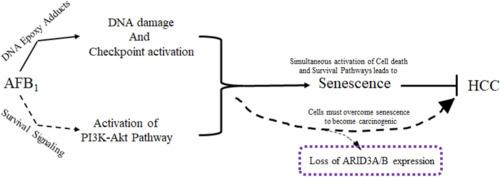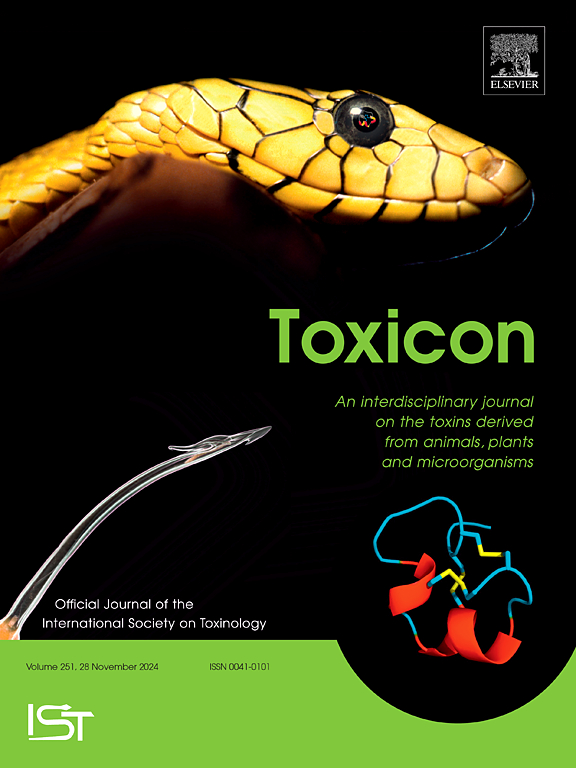Aflatoxin B1 downregulates ARID3 genes to overcome senescence for inducing hepatocellular carcinoma
IF 2.6
4区 医学
Q2 PHARMACOLOGY & PHARMACY
引用次数: 0
Abstract
Aflatoxins are major food contaminants, which cause hepatotoxicity, eventually leading to Hepatocellular carcinoma. Activated AFB1 forms adducts with DNA, which in turn activates checkpoint control. We show that AFB1 activates PI3K-Akt signaling, which is critical for cell survival. Simultaneous activation of both DNA checkpoint and proliferative signaling leads to Oncogene-Induced Senescence, a major tumorigenesis barrier. AFB1 downregulates ARID3A and ARID3B proteins to overcome this senescence program to induce hepatic tumors.

黄曲霉毒素 B1 下调 ARID3 基因,克服衰老诱发肝细胞癌。
黄曲霉毒素是一种主要的食品污染物,可引起肝中毒,最终导致肝细胞癌。活化的 AFB1 与 DNA 形成加合物,进而激活检查点控制。我们的研究表明,AFB1 可激活 PI3K-Akt 信号传导,这对细胞存活至关重要。DNA 检查点和增殖信号的同时激活会导致癌基因诱导衰老,这是肿瘤发生的一个主要障碍。AFB1 可下调 ARID3A 和 ARID3B 蛋白,从而克服这种衰老程序,诱发肝肿瘤。
本文章由计算机程序翻译,如有差异,请以英文原文为准。
求助全文
约1分钟内获得全文
求助全文
来源期刊

Toxicon
医学-毒理学
CiteScore
4.80
自引率
10.70%
发文量
358
审稿时长
68 days
期刊介绍:
Toxicon has an open access mirror Toxicon: X, sharing the same aims and scope, editorial team, submission system and rigorous peer review. An introductory offer Toxicon: X - full waiver of the Open Access fee.
Toxicon''s "aims and scope" are to publish:
-articles containing the results of original research on problems related to toxins derived from animals, plants and microorganisms
-papers on novel findings related to the chemical, pharmacological, toxicological, and immunological properties of natural toxins
-molecular biological studies of toxins and other genes from poisonous and venomous organisms that advance understanding of the role or function of toxins
-clinical observations on poisoning and envenoming where a new therapeutic principle has been proposed or a decidedly superior clinical result has been obtained.
-material on the use of toxins as tools in studying biological processes and material on subjects related to venom and antivenom problems.
-articles on the translational application of toxins, for example as drugs and insecticides
-epidemiological studies on envenoming or poisoning, so long as they highlight a previously unrecognised medical problem or provide insight into the prevention or medical treatment of envenoming or poisoning. Retrospective surveys of hospital records, especially those lacking species identification, will not be considered for publication. Properly designed prospective community-based surveys are strongly encouraged.
-articles describing well-known activities of venoms, such as antibacterial, anticancer, and analgesic activities of arachnid venoms, without any attempt to define the mechanism of action or purify the active component, will not be considered for publication in Toxicon.
-review articles on problems related to toxinology.
To encourage the exchange of ideas, sections of the journal may be devoted to Short Communications, Letters to the Editor and activities of the affiliated societies.
 求助内容:
求助内容: 应助结果提醒方式:
应助结果提醒方式:


